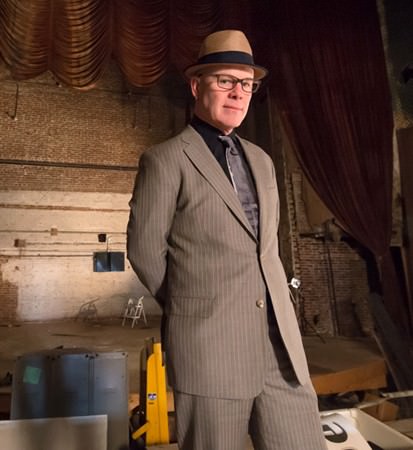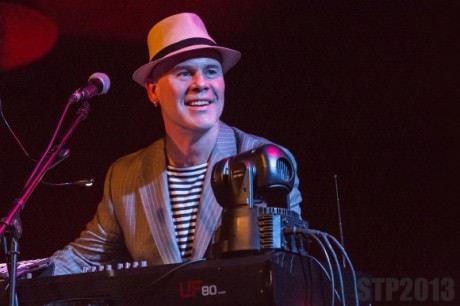In a change that ups the cool factor and vibrancy of Baltimore’s film and music culture exponentially, musician, composer, and digital technology innovator, Thomas Dolby will be moving to the city at the summer’s end to teach a class at Hopkins’ Homewood campus. Sound on Film will be a course dedicated to digital music technology in relation to film.

Although he is known worldwide for his string of innovative techno-pop hits in the 1980s (She Blinded Me with Science, Europa, Hyperactive, Radio Silence), Dolby has a successful background in filmmaking (his documentary, The Invisible Lighthouse-won Best Picture at the DIY Film Festival), writing scores for films and video games, and acting as music director for TED talks. These comprehensive credentials will undoubtedly give Dolby’s students a valuable view of real world application and a career in the arts. As with everything he has been involved in during his career history, he has plans to expand beyond classroom instruction to enrich Baltimore’s media industry.
In addition to being professor of the arts, Dolby will also be involved in a collaboration between MICA, Hopkins, and the Maryland Film Festival to create an art and technology hub that includes the redeveloping of the old Parkway Theatre and surrounding structures. Dolby talks about his latest endeavor and how his vast experience in the techno art world relates to this new career path.
Teresa: How did you initially become involved with Hopkins and receive an offer to teach?
Thomas: I was approached by a different university in Boston with an offer of a position as Professor of the Practice. I was not sold on them or on Boston, but I liked the idea of teaching, and my wife and I were open to the idea of moving to the East Coast because her family is in New York. Then I began talking to Hopkins, and on my visits I found I really liked Baltimore. When they told me about the new media facility they are building in Station North, I made up my mind!
I’m happy that Baltimore won out! Although it may seem a like you are following a new path, you actually come from a family of teachers. Does it seem like a natural progression for you, or is it something you never really imagined?
Yes, my father was an Oxford professor of classical archaeology, and my mum taught algebra and calculus. I have several siblings that have been teachers. A friend of mine joked ‘so you’re finally joining the family firm!’ When I started out I had no-one to teach me, to mentor me. I had to figure it out for myself as I went along. So I always thought that one day I’d try to pass along what I’ve learned.
Yes, you were absolutely a pioneer of MTV and music video in general, and you more recently combined live musical performance with your film, The Invisible Lighthouse. How will you use your vast experience to inform what you teach in Sound on Film?
Dolby: When MTV first hit I saw an opportunity to make silent films like those of my heroes Keaton, Chaplin and Harold Lloyd, but with a rock soundtrack—that was ’She Blinded Me with Science’. When I toured last year projecting my film The Invisible Lighthouse behind me while performing the music, narration and sound effects live on stage, it was also a sort of homage to a past era. So my relationship to visual media is very classical, retro even. Yet I use contemporary technology to tell my stories in a new way. For example the video for ‘Hyperactive!’ was very groundbreaking for its time, utilizing green screen and video manipulation in conjunction with physical props like a cube head with a notepad for a face and hidden microcircuitry. It’s a case of picking the right idiom for the job in hand.
I remember those videos and just recently showed them to my daughters. Could you give a sample of your course description and a taste of what the student experience might be like in your classroom? Will you be drawing from an existing syllabus or crafting your own?
I think the previous course was about Polish avant-garde cinema between the World Wars or some such. So no, I will be creating my own syllabus! In reality the course will be about making music and sound for pictures of any sort—film, TV, games, music videos, the Web. I’d like students to come away with a sense of how to make a soundtrack that can truly enhance the film, add emotional depth, create some magic, sprinkle some fairy dust on it. But they also need a practical knowledge of how to get the job done effectively. Filmmaking has gotten way easier with the advances in digital cameras. You don’t need a huge crew and budget any more, just a great idea and some passion. The picture quality is fantastic but many aspiring filmmakers are let down by their sound.
Sounds excellent! I’m sure your incoming students are very excited. What has been the reaction and feedback from your family and peers on your move to Baltimore?
My family think it’s pretty funny. As a teenager I was two years ahead of my class, but I hated school and I left at 16 and got a job in a fruit’n’veg shop in Notting Hill Gate while I honed my skills as a synth player. There are many doctors and professors in my family but I seemed the most unlikely to ever follow in the fold. My peers in the music industry are perhaps not very surprised I’ve gone this route. I’ve lectured quite a lot within the industry, and at colleges across the country. But lecturing and teaching are very different, I’m sure. It’ll be great to roll my sleeves up and really get to know the students, and the rest of the faculty. My hardcore fans are a little sad because they think it may be years before I come out with any more music—but actually, Hopkins is keen, even insisting that I keep doing my thing outside of my teaching. They want to work with artists that will stay current in the scene, and bring real-world expertise back to the campus with them, to balance the scholarly nature of the university environment. So I do plan to keep making music over the next few years, alongside my professorship. I’m also writing a book about my adventures in the music, tech and mobile worlds, which I hope to have published sometime in late 2015 or 2016.
That was actually my husband’s first response, “Does this mean he will he won’t make more music?!” I look forward to the book. What is your level of involvement with the theater and surrounding arts district refurbishment and what are some ways this space will be used?
I’ve had input into the layout and the plans at various stages. I loved the old photos of the Centre Theater in its Art Deco prime, such an evocative building. It was little more than a hollow shell, so the possibilities were endless. The architects have done a fabulous job with the conversion, but they were perhaps not as conscious of the sound requirements of a professional recording space as I would have liked. So I urged them to bring in outside acoustics designers, and we re-thought the layout so that musicians and engineers can communicate well, even when there are TV productions or film editing going on just down the corridor.
I’ve also consulted on the audio equipment.These days you don’t have to spend millions to get professional sound—this is good news for students, because there will be plenty of space for everyone to get the hours in that they need to become proficient at recording and editing. And of course they can take their work away on laptops and tablets, and keep working under headphones over a cappuccino in some local dive. The range and depth of courses we will be able to offer will be far more wide-reaching than at Homewood and Peabody. It’s exciting that students from JHU and MICA will be sharing some of the same space, so we’ll be devising new courses and encouraging entrepreneurship, startup ideas and so on.
Baltimore is right on the cusp of becoming one of the USA’s major centers for film and TV production. Obviously shows like House Of Cards and The Wire have highlighted the city’s great atmosphere and locations, and the availability of resources and talent. We expect more production companies to move into the area over the next few years. There are many more buildings in Station North that can be refurbished as well as the Parkway and Centre theaters. We believe that as artists and technologists move into the area, it will grow its own culture, with new coffee shops and restaurants, student housing projects, and all sorts of new businesses. I know New Orleans quite well and it’s been inspiring to see how the city has bounced back post Katrina.The film production and arts scene is amazing, and that’s what’s led to other businesses being willing to re-invest. Many residents there say it’s better now than ever. I sense Baltimore is just at the start of a huge growth spurt too. I want to believe that, and I’m going to try to do my part.
I’m delighted that Johns Hopkins, with its long history and relationship with the Baltimore community, which is sometimes tricky, is choosing this time to ‘up its game’ on the arts side. Because of JHU’s amazing tradition in medicine and research, the Arts have sometimes taken a back seat, but I’m hoping to help change that. The revitalization of Station North adds a new dimension that I think the city and the community can truly benefit from. I’m thrilled to be a part of it.

It’s delightful to have you. Two of my daughters take film and may end up in your class someday. In your music career you have worked to varying extents with performers like Malcolm McLaren, George Clinton, David Byrne, Imogene Heap, and one of my favorite artists, Ryuichi Sakomoto. Do you enjoy collaborative projects and do you have any planned for the future?
Dolby: Yes. I’d like to bring artists like these to Baltimore and make our new facilities available to them at Station North to try out experimental ideas with the help of our students. My long-term plan is to produce a TV show out of the Centre Theater where I interview musicians, sound designers and filmmakers about their craft. It would be a little like ‘Inside The Actor’s Studio,’ but updated with the use of transmedia, modern hyperlinking to useful resources, audience interaction and social networking. While I was music director at the TED Conferences we created essentially a new paradigm for sharing and learning, for dissipation of ideas. I’ve always wanted to create a TED-like environment for music discussion and new ideas, and I’m hoping to do it right here in Baltimore. Where better?





Great for Baltimore!
I have been listening to Thomas Dolby since the 80’s and generally following his career: it’s brilliant to see and ultimately hear what comes out of the campus under his tutelage?
I was guest professor at the Staedel School of visual Arts for three years and can only say it’s the most rewarding vocation I have ever experienced til now?
I will definitely be visiting when I go to the states again later this year!
all the best
Eric D. Clark
WHIRLPOOL PRODUCTIONS
SUBCURRENT MEDIA